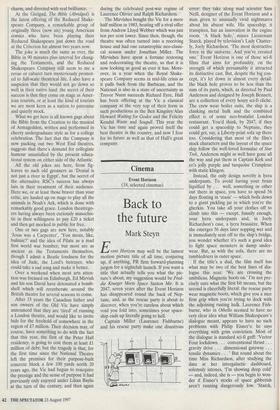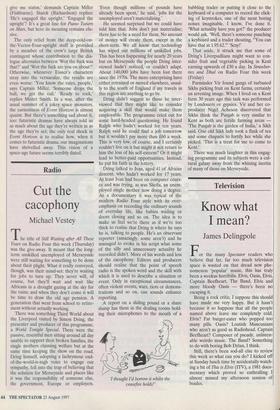Cinema
Event Horizon
(18, selected cinemas)
Back to the future
Mark Steyn
Event Horizon may well be the lamest motion picture title of all time, conjuring up, if anything, PR firm forward-planning jargon for a nightclub launch. If you want a title that actually tells you what the pic- ture's about, my suggestion would be Fred- die Krueger Meets Space Station Mir. It is 2047, seven years after the Event Horizon has disappeared round the back of Nep- tune, and, as the rescue party is about to discover, when you're careless about which void you fold into, sometimes your space- ship ends up literally going to hell.
Captain Miller (Laurence Fishburne) and his rescue party make one disastrous error: they take along mad scientist Sam Neill, designer of the Event Horizon and a man given to unusually vivid nightmares about his absent wife. His spaceship, it transpires, has an innovation in the engine room. 'A black hole,' muses Lieutenant Starck, played by television's Lady Chatter- ly, Joely Richardson. 'The most destructive force in the universe. And you've created one.' Event Horizon is one of those sci-fi films that aims for profundity, on the strength of which presumably it attracted its distinctive cast. But, despite the big con- cept, it's let down in almost every detail: the black hole proves to be less than the sum of its parts, which, as directed by Paul Anderson and designed by Joseph Bennett, are a collection of every hoary sci-fi cliché. The crew wear boiler suits, the ship is a clanking metal hulk and the combined effect is of some neo-brutalist London restaurant. You'd think, by 2047, if they could get a spaceship to Neptune, they could get, say, a Liberty-print sofa up there too. Considering that most of the film's stock characters and the layout of the space ship follow the well-loved formulae of Star Trek, Anderson might as well have gone all the way and put them in Captain Kirk and co's jolly purple and turquoise Crimplene with static klingon.
Instead, the only design novelty is lycra underpants. To avoid having your brain liquified by . . . well, something or other out there in space, you have to spend 56 days floating in 'stasis' — which boils down to a giant pickling jar in which you're the gherkin. You take all your clothes off to climb into this — except, funnily enough, your lycra underpants and, in Joely Richardson's case, a lycra brassiere. When she emerges 56 days later sopping wet and is immediately sent off to the ship's bridge, you wonder whether it's such a good idea to fight space monsters in damp under- wear. But, as with the sofa, there are no tumbledriers in outer space.
If the title's a dud, the film itself has what may be two of the best lines of dia- logue this year: 'We are crossing the umbilicus. Magnetic boots on.' I'm not pre- cisely sure what the first bit means, but the second is cheerfully literal: the rescue party wear magnetic boots, which give you a nice firm grip when you're trying to dock with the adjoining rusting hulk. Laurence Fish- burne, who in Othello seemed to have no very clear idea what William Shakespeare's dialogue meant, appears to have no such problems with Philip Eisner's: he says everything with grim conviction. Most of the dialogue is standard sci-fi guff: 'Vector Four lockdown . . . conventional thrust . . . gravity drive . . . dimensional gateway . . . tensile dynamics . . . ' But round about the time Miss Richardson, after studying the data at her intergalactic dashboard, solemnly intones, 'I'm showing deep cold' — and, indeed, she is — you begin to won- der if Eisner's stocks of space gibberish aren't running dangerously low. `Starck, give me status,' demands Captain Miller (Fishburne). Starck (Richardson) replies: `He's engaged the upright.' Engaged the upright'? It's a great line for Piano Tuners on Mars, but here its meaning remains elu- sive.
The only relief from the deep-cold-on- the-Vector-Four-upright stuff is provided by a member of the crew's large British contingent whose contribution to the dia- logue alternates between `Wot the fuck was that?' and `Wot the fuck are you on about?' Otherwise, whenever Eisner's characters stray into the vernacular, the results are even worse: 'You know the rules, people,' says Captain Miller. 'Someone drops the ball, we get the call.' Ready to rock,' replies Mister Smith. In a way, after the usual summer of a jokey space monsters, the earnestness of Event Horizon is almost quaint. But there's something sad about it, too: futuristic dramas have always told us as much about the age they're written in as the age they're set; the only real shock in Event Horizon is to realise how, when it comes to futuristic drama, our imaginations have shrivelled away. This vision of a space-age future seems terribly dated.



























































 Previous page
Previous page